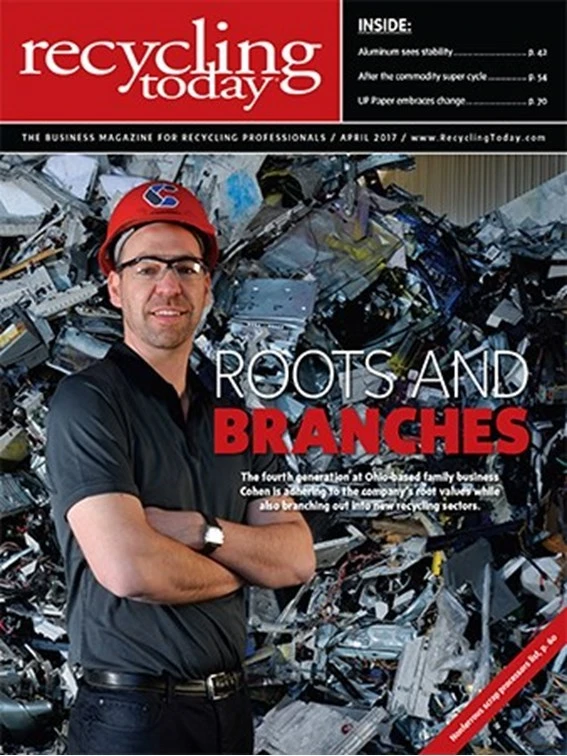Johnson Controls, Aqua Metals sign partnership agreement

Johnson Controls, the largest manufacturer of automotive batteries in the world, has finalized an agreement covering North America, China and Europe with Aqua Metals, which has developed electrochemical battery recycling technology. Under terms of the deal, Johnson Controls, which has its North American headquarters in Milwaukee, also will take a small stake in Alameda, California-based Aqua Metals.
Aqua Metals’ AquaRefining technology extracts lead from lead-acid batteries using a room temperature, closed loop, water-based process, reducing hazardous waste generation and direct human contact with lead. The process produces lead that is as pure as—or purer than—mined lead, requiring no secondary processing, Aqua Metals says. (See www.RecyclingToday.com/article/disruptive-technology for an article on Aqua Metals from the January 2017 Scrap Metals Supplement.)
“Our partnership with Johnson Controls is a tremendous step forward and is an opportunity for us to work with the global leader in automotive battery manufacturing and responsible recycling,” says Stephen Clarke, chairman and CEO of Aqua Metals. “We will build on this exciting relationship in order to enable clean and efficient battery recycling around the world.”
Under the agreement, Johnson Controls also will become the first licensee for AquaRefining technology; supply Aqua Metals with batteries to recycle as a service as part of the Johnson Controls closed loop network; purchase AquaRefined metals produced from Aqua Metals’ facilities; and acquire slightly less than 5 percent of Aqua Metals’ outstanding shares.
Aqua Metals, which has opened its first battery recycling plant at the Tahoe-Reno Industrial Center (TRIC) in McCarran, Nevada, uses an electrochemical process to recycle batteries.
Johnson Controls Power Solutions is the world’s largest manufacturer of automotive batteries. The company says it supplies 152 million batteries annually to automakers and aftermarket retailers.
Anti-pollution efforts affect global aluminum outlook
The value of aluminum on the London Metal Exchange (LME) reached $1,907 per metric ton (86.5 cents per pound) briefly during trading Feb. 14, 2017. It was the highest value reached by the light metal since May 2015, according to a Reuters report.
The price rise came the day after reports about a policy under consideration in China to more intensely scrutinize emissions at steel mills and aluminum production plants.
In that policy’s first draft, according to an online report from Reuters, China’s Ministry of Environmental Protection (MEP) has proposed measures that could slash steel capacity by some 50 percent and aluminum capacity by 30 percent in several different parts of China.
The northeast of China is a particular focus of the policy as it has been battling visibly high air pollution for several years.
The first draft of the policy outlines plans to cut steel and fertilizer capacity in the country by at least half and aluminum capacity by at least 30 percent in 28 cities across five regions.
The government scrutiny of aluminum production is occurring in tandem with widely reported public protests against a proposed aluminum plant located in northern China.
According to an online report from the Financial Times, “mass protests” in the city of Daqing in Heilongjiang province have been directed against a proposed Zhongwang Holdings facility.
Opposition from citizens reportedly centers around potential air pollution and contamination of Daqing’s water supply. Water periodically and seasonally can be in tight supply in China’s Heilongjiang province.
Zhongwang Holdings also is the subject of controversy in North America, where one media investigation is questioning whether members of its ownership group have been shipping aluminum into the United States using methods that allow it to avoid customs duties. The principal owner of Zhongwang Holdings also has made a bid to acquire U.S.-based aluminum firm Aleris. Aleris Corp. is expected to be a direct, wholly owned subsidiary of Zhongwang USA.
A protester quoted by the Financial Times comments, “If the government does not truly stop construction, then we will continue to protest. I have never protested against the government before.”
LME reports reduced activity in 2016

Hong Kong Exchanges and Clearing Ltd. (HKEX), the Hong Kong-based owner of the London Metal Exchange (LME), has reported its year-end 2016 results for the LME, which include declines in trading volume and in revenue.
In a 50-page summary of its 2016 results, HKEX discloses that the LME’s $1.56 billion in revenue for the year was down by 10 percent compared with more than $1.73 billion in revenue in 2015.
The LME’s EBITDA (earnings before interest, taxes, depreciation and amortization) declined by 19 percent from year to year, falling from $1.19 billion in 2015 to $963 million in 2016.
Trading activity, as measured by metals contract volume, declined by 8 percent on the LME in 2016 versus 2015. It dropped from 670 million metric tons under contract in 2015 to closer to 619 million metric tons in 2016. Trading in aluminum showed a larger volume and higher percentage drop of 10 percent compared with copper at 6 percent.
“2016 saw a continuation of 2015’s challenging market conditions, with a consequent reduction in volumes,” HKEX says in summarizing the LME’s 2016 results.
Regarding the LME’s 19 percent drop in profit margin, HKEX refers to the LME’s increased expenses, saying, “The increase was principally attributable to increased headcount for strategic initiatives (including product development and the establishment of a commodities trading platform in the [People’s Republic of China]), higher premises costs for new offices in London and [China] and also higher legal and professional fees incurred on strategic projects.”

Explore the April 2017 Issue
Check out more from this issue and find your next story to read.
Latest from Recycling Today
- BMW Group, Encory launch 'direct recycling’ of batteries
- Loom Carbon, RTI International partner to scale textile recycling technology
- Goodwill Industries of West Michigan, American Glass Mosaics partner to divert glass from landfill
- CARI forms federal advocacy partnership
- Monthly packaging papers shipments down in November
- STEEL Act aims to enhance trade enforcement to prevent dumping of steel in the US
- San Francisco schools introduce compostable lunch trays
- Aduro graduates from Shell GameChanger program





